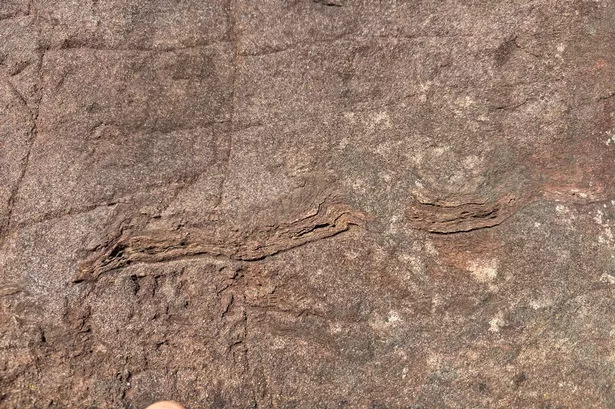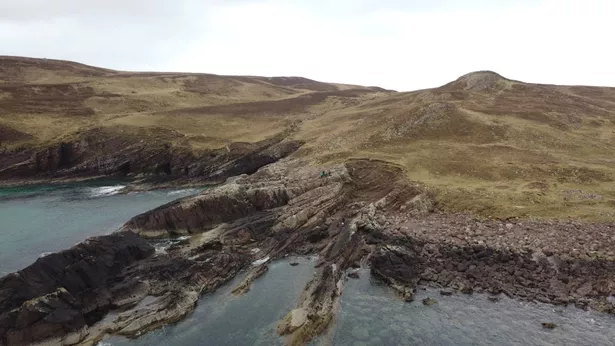New evidence shows a meteorite struck Scotland 990 million years ago, reshaping Earth’s timeline and possibly helping early life reach land New geological findings show that a meteorite impact could have helped some ancient life to colonise land.(Image: Tony Prave)
New geological findings show that a meteorite impact could have helped some ancient life to colonise land.(Image: Tony Prave)
New geological findings from Scotland have upended previous assumptions about the planet’s ancient past, and hint that a colossal meteorite impact may have played a surprising role in life’s first move onto land.
Scientists now believe a huge space rock slammed into what is now northwestern Scotland 990 million years ago, revising earlier estimates that placed the event at 1.2 billion years ago. The findings, published in the journal Geology, offer fresh insights into how meteorites may have helped shape Earth’s early ecosystems.
The ancient impact created the Stac Fada Member, a distinctive layer of rock that has long intrigued researchers. Thanks to advanced analysis of microscopic zircon crystals within the rocks, experts were able to narrow down the timing of the impact with remarkable precision.
“These microscopic crystals recorded the exact moment of impact, with some even transforming into an incredibly rare mineral called reidite, which only forms under extreme pressures,” said lead author Chris Kirkland from Curtin University in Western Australia.
 Scientists believe a huge space rock slammed into what is now northwestern Scotland 990 million years ago(Image: Getty Images)
Scientists believe a huge space rock slammed into what is now northwestern Scotland 990 million years ago(Image: Getty Images)
“This provided undeniable proof that a meteorite strike caused the Stac Fada deposit.”
Kirkland explained that meteor strikes partially reset the atomic clocks inside zircon crystals.
“These ‘broken timepieces’ are often unable to be dated, but we developed a model to reconstruct when the disturbance occurred, confirming the impact at 990 million years ago,” he said.
Although the location of the impact crater remains undiscovered, the study has offered promising new clues that could eventually pinpoint its site.
These details may ultimately lead to the discovery of the crater, giving scientists an even clearer understanding of the meteorite’s role in shaping the Earth’s geological landscape.
 The ancient impact created the Stac Fada Member, a distinctive layer of rock(Image: Tony Prave)
The ancient impact created the Stac Fada Member, a distinctive layer of rock(Image: Tony Prave)
Beyond reworking the geological timeline, the discovery also opens the door to intriguing questions about the evolution of early life.
While plants are believed to have first colonised land around 470 million years ago, followed by arthropods such as insects and spiders about 425 million years ago, the first vertebrates, ancestors of humans, appeared on land roughly 400 million years ago.
But long before any of these organisms emerged, single-celled eukaryotes, the ancestors of plants, animals and fungi, had already begun venturing out of Earth’s oceans.
This transition marks one of the earliest steps in the story of life on land, but it happened long before the more complex organisms such as plants and arthropods made their way onto solid ground.
 Join the Daily Record WhatsApp community!
Join the Daily Record WhatsApp community!
Get the latest news sent straight to your messages by joining our WhatsApp community today.
You’ll receive daily updates on breaking news as well as the top headlines across Scotland.
No one will be able to see who is signed up and no one can send messages except the Daily Record team.
All you have to do is click here if you’re on mobile, select ‘Join Community’ and you’re in!
If you’re on a desktop, simply scan the QR code above with your phone and click ‘Join Community’.
We also treat our community members to special offers, promotions, and adverts from us and our partners. If you don’t like our community, you can check out any time you like.
To leave our community click on the name at the top of your screen and choose ‘exit group’.
If you’re curious, you can read our Privacy Notice.
Kirkland’s team found evidence of freshwater eukaryotes in the region dating back to the same time as the newly dated impact, suggesting a potential link between the two events.
This discovery adds a compelling layer to the ongoing narrative of how life evolved and adapted to the changing conditions of our planet.
“The revised dating suggests these life forms in Scotland appeared at a similar time to a meteorite impact,” Kirkland said. “This raises fascinating questions about whether large impacts may have influenced environmental conditions in ways that affected early ecosystems.
“Understanding when meteorite impacts occurred helps us explore their potential influence on Earth’s environment and the expansion of life beyond the oceans.”
